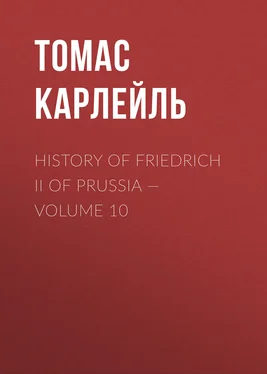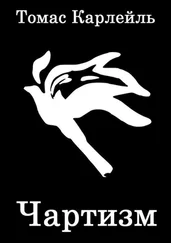Томас Карлейль - History of Friedrich II of Prussia — Volume 10
Здесь есть возможность читать онлайн «Томас Карлейль - History of Friedrich II of Prussia — Volume 10» — ознакомительный отрывок электронной книги совершенно бесплатно, а после прочтения отрывка купить полную версию. В некоторых случаях можно слушать аудио, скачать через торрент в формате fb2 и присутствует краткое содержание. Жанр: foreign_prose, История, literature_19, foreign_edu, foreign_antique, на английском языке. Описание произведения, (предисловие) а так же отзывы посетителей доступны на портале библиотеки ЛибКат.
- Название:History of Friedrich II of Prussia — Volume 10
- Автор:
- Жанр:
- Год:неизвестен
- ISBN:нет данных
- Рейтинг книги:4 / 5. Голосов: 1
-
Избранное:Добавить в избранное
- Отзывы:
-
Ваша оценка:
- 80
- 1
- 2
- 3
- 4
- 5
History of Friedrich II of Prussia — Volume 10: краткое содержание, описание и аннотация
Предлагаем к чтению аннотацию, описание, краткое содержание или предисловие (зависит от того, что написал сам автор книги «History of Friedrich II of Prussia — Volume 10»). Если вы не нашли необходимую информацию о книге — напишите в комментариях, мы постараемся отыскать её.
History of Friedrich II of Prussia — Volume 10 — читать онлайн ознакомительный отрывок
Ниже представлен текст книги, разбитый по страницам. Система сохранения места последней прочитанной страницы, позволяет с удобством читать онлайн бесплатно книгу «History of Friedrich II of Prussia — Volume 10», без необходимости каждый раз заново искать на чём Вы остановились. Поставьте закладку, и сможете в любой момент перейти на страницу, на которой закончили чтение.
Интервал:
Закладка:
We have to say of Friedrich's Associates, that generally they were of intelligent type, each of them master of something or other, and capable of rational discourse upon that at least. Integrity, loyalty of character, was indispensable; good humor, wit if it could be had, were much in request. There was no man of shining distinction there; but they were the best that could be had, and that is saying all. Friedrich cannot be said, either as Prince or as King, to have been superlatively successful in his choice of associates. With one single exception, to be noticed shortly, there is not one of them whom we should now remember except for Friedrich's sake;—uniformly they are men whom it is now a weariness to hear of, except in a cursory manner. One man of shining parts he had, and one only; no man ever of really high and great mind. The latter sort are not so easy to get; rarely producible on the soil of this Earth! Nor is it certain how Friedrich might have managed with one of this sort, or he with Friedrich;—though Friedrich unquestionably would have tried, had the chance offered. For he loved intellect as few men on the throne, or off it, ever did; and the little he could gather of it round him often seems to me a fact tragical rather than otherwise.
With the outer Berlin social world, acting and reacting, Friedrich has his connections, which obscurely emerge on us now and then. Literary Eminences, who are generally of Theological vesture; any follower of Philosophy, especially if he be of refined manners withal, or known in fashionable life, is sure to attract him; and gains ample recognition at Reinsberg or on Town-visits. But the Berlin Theological or Literary world at that time, still more the Berlin Social, like a sunk extinct object, continues very dim in those old records; and to say truth, what features we have of it do not invite to miraculous efforts for farther acquaintance. Venerable Beausobre, with his History of the Manicheans, [ Histoire critique de Manichee et du Manicheisme: wrote also Remarques &c. sur le Nouveau Testament, which were once famous; Histoire de la Reformation; &c. &c. He is Beausobre SENIOR; there were two Sons (one of them born in second wedlock, after Papa was 70), who were likewise given to writing.—See Formey, Souvenirs d'un Citoyen since, in Toland and the Republican Queen's time, as a light of the world. He is now fourscore, grown white as snow; very serene, polite, with a smack of French noblesse in him, perhaps a smack of affectation traceable too. The Crown-Prince, on one of his Berlin visits, wished to see this Beausobre; got a meeting appointed, in somebody's rooms "in the French College," and waited for the venerable man. Venerable man entered, loftily serene as a martyr Preacher of the Word, something of an ancient Seigneur de Beausobre in him, too; for the rest, soft as sunset, and really with fine radiances, in a somewhat twisted state, in that good old mind of his. "What have you been reading lately, M. de Beausobre?" said the Prince, to begin conversation. "Ah, Monseigneur, I have just risen from reading the sublimest piece of writing that exists."—"And what?" "The exordium of St. John's Gospel: In the Beginning was the Word; and the Word was with God, and the Word was—" Which somewhat took the Prince by surprise, as Formey reports; though he rallied straightway, and got good conversation out of the old gentleman. To whom, we perceive, he writes once or twice, [ OEuvres de Frederic, 121-126. Dates are all of 1737; the last of Beausobre's years.]—a copy of his own verses to correct, on one occasion,—and is very respectful and considerate.
Formey tells us of another French sage, personally known to the Prince since Boyhood; for he used to be about the Palace, doing something. This is one La Croze; Professor of, I think, "Philosophy" in the French College: sublime Monster of Erudition, at that time; forgotten now, I fear, by everybody. Swag-bellied, short of wind; liable to rages, to utterances of a coarse nature; a decidedly ugly, monstrous and rather stupid kind of man. Knew twenty languages, in a coarse inexact way. Attempted deep kinds of discourse, in the lecture-room and elsewhere; but usually broke off into endless welters of anecdote, not always of cleanly nature; and after every two or three words, a desperate sigh, not for sorrow, but on account of flabbiness and fat. Formey gives a portraiture of him; not worth copying farther. The same Formey, standing one day somewhere on the streets of Berlin, was himself, he cannot doubt, SEEN by the Crown-Prince in passing; "who asked M. Jordan, who that was," and got answer:—is not that a comfortable fact? Nothing farther came of it;—respectable Ex-Parson Formey, though ever ready with his pen, being indeed of very vapid nature, not wanted at Reinsberg, as we can guess.
There is M. Achard, too, another Preacher, supreme of his sort, in the then Berlin circles; to whom or from whom a Letter or two exist. Letters worthless, if it were not for one dim indication: That, on inquiry, the Crown-Prince had been consulting this supreme Achard on the difficulties of Orthodoxy; [ OEuvres de Frederic, xvi. pp. 112-117: date, March-June, 1736.] and had given him texts, or a text, to preach from. Supreme Achard did not abolish the difficulties for his inquiring Prince,—who complains respectfully that "his faith is weak," and leaves us dark as to particulars. This Achard passage is almost the only hint we have of what might have been an important chapter: Friedrich's Religious History at Reinsberg. The expression "weak faith" I take to be meant not in mockery, but in ingenuous regret and solicitude; much painful fermentation, probably, on the religious question in those Reinsberg years! But the old "GNADENWAHL" business, the Free-Grace controversy, had taught him to be cautious as to what he uttered on those points. The fermentation, therefore, had to go on under cover; what the result of it was, is notorious enough; though the steps of the process are not in any point known.
Enough now of such details. Outwardly or inwardly, there is no History, or almost none, to be had of this Reinsberg Period; the extensive records of it consisting, as usual, mainly of chaotic nugatory matter, opaque to the mind of readers. There is copious correspondence of the Crown-Prince, with at least dates to it for most part: but this, which should be the main resource, proves likewise a poor one; the Crown-Prince's Letters, now or afterwards, being almost never of a deep or intimate quality; and seldom turning on events or facts at all, and then not always on facts interesting, on facts clearly apprehensible to us in that extinct element.
The Thing, we know always, IS there; but vision of the Thing is only to be had faintly, intermittently. Dim inane twilight, with here and there a transient SPARK falling somewhither in it;—you do at last, by desperate persistence, get to discern outlines, features:—"The Thing cannot always have been No-thing," you reflect! Outlines, features:—and perhaps, after all, those are mostly what the reader wants on this occasion.
Chapter II. — OF VOLTAIRE AND THE LITERARY CORRESPONDENCES
One of Friedrich's grand purposes at Reinsberg, to himself privately the grandest there, which he follows with constant loyalty and ardor, is that of scaling the heights of the Muses' Hill withal; of attaining mastership, discipleship, in Art and Philosophy;—or in candor let us call it, what it truly was, that of enlightening and fortifying himself with clear knowledge, clear belief, on all sides; and acquiring some spiritual panoply in which to front the coming practicalities of life. This, he feels well, will be a noble use of his seclusion in those still places; and it must be owned, he struggles and endeavors towards this, with great perseverance, by all the methods in his power, here, or wherever afterwards he might be.
Читать дальшеИнтервал:
Закладка:
Похожие книги на «History of Friedrich II of Prussia — Volume 10»
Представляем Вашему вниманию похожие книги на «History of Friedrich II of Prussia — Volume 10» списком для выбора. Мы отобрали схожую по названию и смыслу литературу в надежде предоставить читателям больше вариантов отыскать новые, интересные, ещё непрочитанные произведения.
Обсуждение, отзывы о книге «History of Friedrich II of Prussia — Volume 10» и просто собственные мнения читателей. Оставьте ваши комментарии, напишите, что Вы думаете о произведении, его смысле или главных героях. Укажите что конкретно понравилось, а что нет, и почему Вы так считаете.









